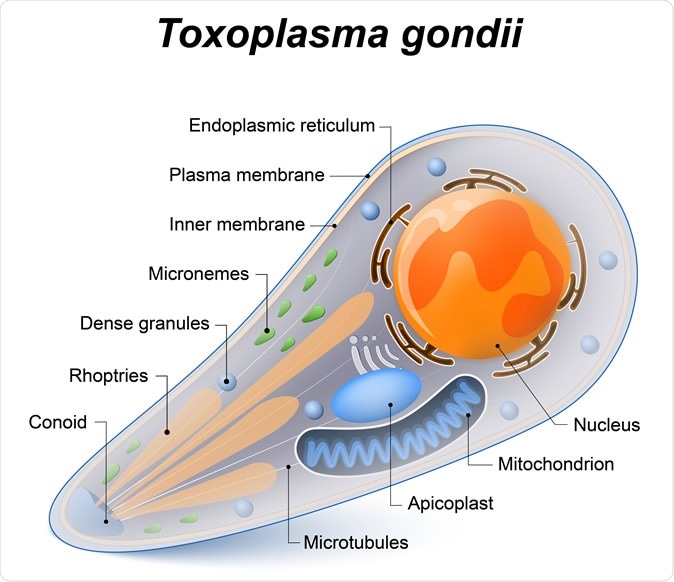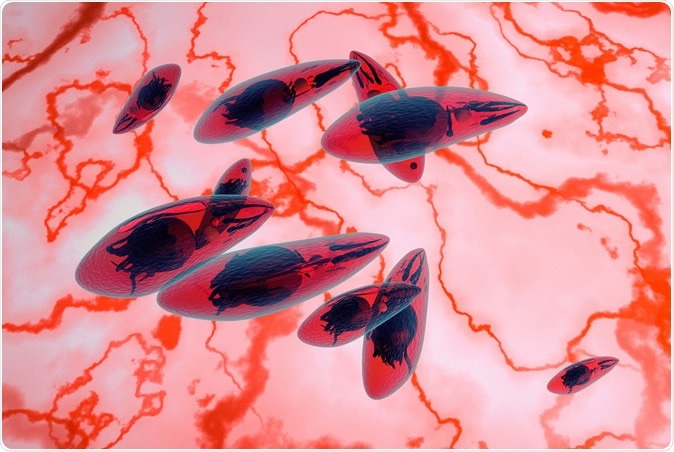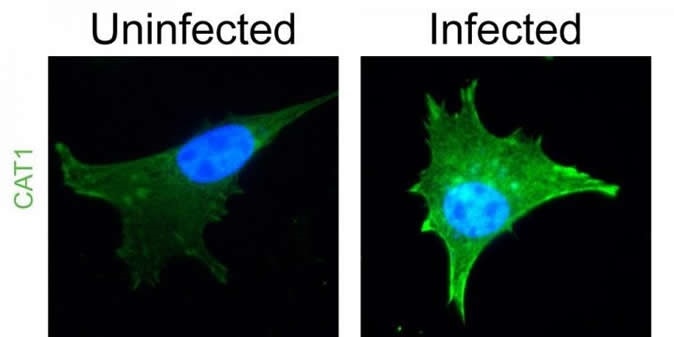A team of researchers has found that a dangerous type of parasite that affects the brain, maintains a stable supply of essential nutrients as it replicates in the host cell. In an unexpected turn of events, the body itself delivers food to the harmful predator.

Toxoplasma gondii is an obligate intracellular, parasitic protozoan that causes the disease toxoplasmosis. Diagram of Toxoplasma structure. Image Credit: Designua / Shutterstock
Toxoplasma gondii, the causative agent of Toxoplasmosis, is one of the most common parasitic infections worldwide. The Centers for Disease Control and Prevention (CDC) reports that approximately 11 percent of the population, 6 years old and above, have been infected with the parasite.
Moreover, more than 60 percent of some populations across the globe acquired the infection at some point in their lives. Most of the cases occur in locations that have humid and hot climates, and lower altitudes, providing an environment conducive for oocyte survival.

Toxoplasma gondii. Image Credit: fotovapl / Shutterstock
Rapid depletion of essential nutrients in host cells
This new study shows that the parasite is auxotrophic for many nutrients such as tryptophan, arginine, and purines. This means that the organism has an additional nutritional growth requirement, and it gets the nutrients from the host. Due to the higher demand for nutrients in the host cells due to the invasion of the parasites, rapid depletion of essential nutrients alerts the body. The body, in turn, stimulates bodily processes to compensate with the depleted nutrient supply.

This image shows increased expression of an arginine transporter (CAT1, green) in host cells infected with Toxoplasma parasites (nuclei stained blue). Image Credit: Indiana University
Activation of the integrated stress response
The researchers led by Leo Augusto, a postdoctoral fellow, in collaboration with Ronald Wek, a molecular biology professor, and Bill Sullivan, a microbiology professor, found that cellular starvation of essential nutrients triggers a stress response, known as the integrated stress response (ISR), that occurs in the first two hours of parasite infection.
Nutrient starvation stimulates the integrated stress response (ISR) through the process of phosphorylation that involves an essential translation factor, eIF2 (eukaryotic translation initiation factor). As a result, this decreases global protein synthesis parallel to the preferential translation of gene transcripts linked to stress adaptation, including encoding the transcription factor ATF4 (CREB2). This triggers genes that control amino acid metabolism.
Host cells sense their nutrients being depleted
The researchers used many mutant host cells to determine that GCN2, a type of protein, becomes stimulated and activated as the parasites proliferate and consume the cell’s arginine supply. As the cell’s supply decreases, they mapped what happened after the activation of the protein. They discovered that the host cells invaded by Toxoplasma gondii produce more CAT1, an arginine transporter, on the cell’s surface. As a result, the body senses the depleted arginine supply. The arginine transporter attracts more arginine, hence, the parasite continues to consume the nutrients it needs to survive.
The study findings suggest that host cells have the ability to feel when their nutrients are not enough for their needs. Unaware of the parasites invading then, they try to provide more arginine supply to make up for the depleted supply.
“Pathogens that live and grow inside of cells face special challenges," Sullivan said in a statement. "Intracellular pathogens have to replicate without raising alarms, but to grow, they need to pilfer nutrients from the host. Our study shows that Toxoplasma gets additional nutrients simply by hijacking a starvation response already built into the host cell,” he added.
Findings can help modify treatments
The results may pave the way to formulate treatment modalities for Toxoplasmosis, and other intracellular infections. Plus, identifying proteins like CGN2, which are vital for parasite growth and proliferation, may show promise in formulating new drugs to curb parasitic infections and treat other intracellular pathogens.
Toxoplasmosis can occur in people exposed to the feces of an infected cat, eating undercooked and contaminated meat, and through blood transfusion. Though humans may not manifest signs and symptoms of infection, the parasite can be tremendously dangerous for vulnerable individuals of the population, including pregnant mothers.
In fact, infection during pregnancy may lead to serious complications, such as stillbirth or miscarriage. Infants born with the infection are at a heightened risk of jaundice, seizures, liver enlargement, and eye infections. In worse cases, the infant may manifest mental disability or hearing loss. Hence, preventing exposure to common sources of the parasite is important during pregnancy.
The National Institutes of Health funded the study, which was published in the journal PLOS Pathogens.
Journal reference:
Regulation of arginine transport by GCN2 eIF2 kinase is important for replication of the intracellular parasite Toxoplasma gondii , Augusto L, Amin PH, Wek RC, Sullivan WJ Jr (2019) Regulation of arginine transport by GCN2 eIF2 kinase is important for replication of the intracellular parasite Toxoplasma gondii. PLOS Pathogens 15(6): e1007746. https://doi.org/10.1371/journal.ppat.1007746